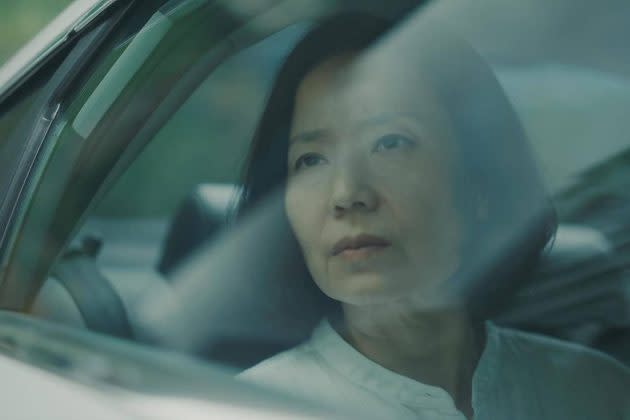‘Concerning My Daughter’ Review: A Glowing Central Turn Illuminates a Tender Tale of Maternal Acceptance

For us dazzled foreigners, it’s easy to forget that South Korea — land of superfast internet, glossy K-Pop, state-of-the-art foldable phones and “Squid Game” — is not in every respect the utopia of hypermodernity its recent global cultural boom might lead one to suspect. The nation actually lags some way behind other developed democracies in terms of LGBTQ rights, a fact that drives Lee Mirang’s supple, sincere feature debut, “Concerning My Daughter,” which locates its conflict in the fraught relationship between a gay woman and her uncomprehending parent, but finds its heart in a subtle, radiant performance by Oh Minae as the anguished mother.
Oh’s unnamed character is a widow in her fifties (which puts her quite a bit younger than her counterpart in Kim Hye-jin’s source novel) who initially seems to be living a solitary existence, stumbling under the weight of a massive watermelon, up the hill to her empty home. But later, as she dozes on the sofa, her daughter Green (Lim Semi) lets herself in and heads upstairs without so much as a sideways glance. She is too busy flirting with her lover over the phone.
More from Variety
Green, a part-time university lecturer and an outspoken gay-rights advocate has come to ask for help meeting her rent. Her mother proposes an alternate solution: that Green move back into her house. Eventually, as campus life becomes untenable following protests in defense of a lesbian professor who’s been fired on a pretext (but really because her sexuality made some students uncomfortable) Green is forced to accept. But her girlfriend, Rain (Ha Yoonkyung) comes with her, and suddenly their seven-year relationship — one her mother had simply looked away from, as though it were a passing fad — can no longer be ignored.
So far, so simple: this is territory that has been mined by many a protracted-coming-out story before. But where Lee’s film excels is in the unexpected compassion it extends towards Oh’s character, who may be frosty at home, but at her job as an elder-care nurse, is passionately committed to her patients, and to one in particular. Mrs Lee (Heo Jin) a woman who dedicated her life to rescuing children from poverty but has no children of her own to take care of her in her dotage, is in the early stages of Alzheimers. As she deteriorates, even the foundation that bears her name makes moves to withdraw its sponsorship, and the facility’s administrators decide first to downgrade her to a crowded ward and then to offload her altogether, to a run-down facility on the outskirts.
So while making Rain feel as unwelcome as possible, and having frequent spats with Green — the tenor of which is brilliantly played by both actresses, accessing a mother/daughter chemistry made of equal parts love and piercing mutual disappointment — Oh’s character is also fighting tooth and nail for Mrs Lee’s right to late-life dignity. It’s not clear if she herself even realizes that part of the ferocity of her attachment to the old lady might be displaced affection for her own daughter. But certainly, her experiences at the care home inform her homophobia, which springs less from deep-rooted prejudice than from the pragmatic — if misguided — belief that without a husband and kids (Korea does not allow same-sex marriage or adoption by same-sex couples) Green, too, may end up dying alone.
That prospect is a terror we can read into Oh’s tiniest gesture and expression, just as we can watch dismay and joy and anger scud across her face like clouds in changing weather. In DP Kim Jiryong’s cool, clean, pellucid photography Oh’s face becomes the film’s secret weapon, endlessly watchable whether lighting up with surprise when a mischievous Mrs Lee pops a candy unexpectedly into her mouth, or hardening into dismissive refusal as Rain offers her olive branch after olive branch.
“We just have to be a little tolerant,” says Green slyly about her mother’s rigidity, and Rain, helpful and kind, never wavers, always finding another cheek to turn. It’s perhaps a little trite that she is such a saint, as if gay people only deserve their basic rights if they are tirelessly good-humored in the face of bigotry, and morally unimpeachable in every other way.
But then again, Rain’s glowy goodness is also what alerts her girlfriend’s mother to the similarities between them. Soon it’s Rain who takes on the caregiving role, making dinners and pancakes, playing with the neighbors’ kids and generally eroding her ersatz mother-in-law’s defensive wall of disapproval, until it very gently crumbles, without much fanfare save for the faintest of smiles. Some mothers just need reassurance that, after they’re gone, their kids will have somebody around to lighten the load. When they do the grocery run, Green and Rain take one side each of the net, sharing the weight of the watermelon.
Best of Variety
Sign up for Variety’s Newsletter. For the latest news, follow us on Facebook, Twitter, and Instagram.

